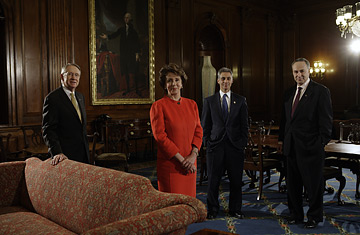
United States Senator from Nevada Harry Reid, Congresswoman Nancy Pelosi from California, Congressman Rahm Emmanuel from Illinois and U.S. Senator Charles E. Schumer from New York in the Rayburn room in the U.S. Capitol.
Certainly, the 233 House Democrats to be sworn in will have an easier time passing their legislative agenda. House rules give incoming Speaker Nancy Pelosi the power to shut out Republicans, which she plans to do in the first 100 hours of the legislative session as she pushes through a host of party-friendly bills, such as increasing the minimum wage and requiring the federal government to negotiate lower prices with pharmaceutical firms for Medicare's prescription drug benefit plan. Fostering better bipartisan relations — another promise Pelosi made — will probably have to wait for a hundred days.
But ramming bills through the House could end up being little more than a symbolic gesture. The tougher test for Democrats will be getting the same measures through the Senate, where the incoming majority leader, Harry Reid, will have only a one-vote majority and the Republicans will have the procedural power to gum up his agenda. Reid discovered just how slender his majority will be when South Dakota Democrat Sen. Tim Johnson was rushed to the hospital on Dec. 13 with a brain hemorrhage. (He remains in critical condition.)
Even with Johnson healthy, Reid will have to find a way to accommodate Republicans' strong opposition to tinkering with the Medicare benefit they passed in 2003 and to forcing the Administration to bargain with drug companies. To pass a hike in the minimum wage, Reid will likely have to give G.O.P. senators small-business tax breaks in return. "Reid understands that the only way he can get legislation passed is to work on a bipartisan basis with the Republicans," says his spokesman, Jim Manley.
The mega-issue that will preoccupy Democrats the next two years — and perhaps determine whether they keep their majority after 2008 — will be Iraq. For the past three years Democrats could paint the war as the Republicans' misadventure because the G.O.P. controlled both the White House and Congress. But Democrats now control the purse strings for that war — and with that power comes a new measure of responsibility. The Pentagon will come to Congress next month with a request for an additional $99.7 billion to pay for the wars in Iraq and Afghanistan until September, which marks the end of the fiscal year. Pelosi and Reid will have to decide if they want to alter Administration war strategy through funding cuts or by attaching conditions to the funding.
Funding will not be the only Iraq issue at hand. Hoping to keep Bush in the cross hairs, the Democrats who take over the armed services committees — Carl Levin in the Senate and Ike Skelton in the House — plan aggressive oversight hearings to investigate Bush missteps in the conduct of the war. And force levels in Iraq will also be a fierce topic of debate. Bush is mulling plans to increase the 140,000 troops there in order to launch surge operations against insurgents in and around Baghdad. Key Democrats like Levin and Sen. Joseph Biden, who takes over the Foreign Relations Committee, adamantly oppose a force increase. Levin favors a phased withdrawal of U.S. soldiers, much like the recommendation of the Iraq Study Group that former Secretary of State James Baker and former Indiana Rep. Lee Hamilton chaired.
But even before a decision is made to expand or shrink the U.S. military presence in Iraq, Congress may face the politically touchy question this year of whether to increase the involuntary call-up of National Guard or Army Reserve troops for Iraq duty. Army Chief of Staff Gen. Peter Schoomaker has warned that his active force will break down if it isn't replenished with more Guard and Reserve soldiers. But members of Congress know that these part-time warriors, whose ranks have also been strained by Iraq deployments, are political powerful constituencies in their congressional districts.
Republicans have no interest in making things easy for their Democratic usurpers. They plan to offer their own bills and hope to peel off conservative Democrats to form majorities. On contentious measures, Reid will have to muster 60 votes, the number needed in the Senate to cut off a filibuster. Bush also has the veto. "We don't want to look like sore losers," says a senior House G.O.P. aide. "But our strategy will be to show the contrast between Republicans and Democrats and make our voices louder."
Still, Democratic and Republican lawmakers know each party pays a price in two years if legislative gridlock continues. Reid and Senate Minority Leader Mitch McConnell plan to begin the new session with a closed meeting of all Republicans and Democrats in the Capitol to discuss ways they can get along. "Both understand the need to change the way D.C. operates," says Manley.
